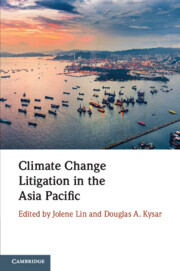Book contents
- Climate Change Litigation in the Asia Pacific
- Climate Change Litigation in the Asia Pacific
- Copyright page
- Contents
- Figures
- Tables
- Contributors
- Foreword
- Abbreviations
- Introduction
- Part I Theoretical Underpinnings and Implications of Climate Change Litigation
- Part II International Law and International Adjudication
- Part III Domestic Law and Domestic Adjudication
- 7 ‘Next Generation’ Climate Change Litigation in Australia
- 8 Climate Change Litigation: A Possibility for Malaysia?
- 9 Climate Change Litigation in Indonesia
- 10 From Shehla Zia to Asghar Leghari: Pronouncing Unwritten Rights Is More Complex than a Celebratory Tale
- 11 Climate Change Adaptation Litigation: A View from Southeast Asia
- Part IV China, Courts and Climate Change
- Index
7 - ‘Next Generation’ Climate Change Litigation in Australia
from Part III - Domestic Law and Domestic Adjudication
Published online by Cambridge University Press: 06 November 2020
- Climate Change Litigation in the Asia Pacific
- Climate Change Litigation in the Asia Pacific
- Copyright page
- Contents
- Figures
- Tables
- Contributors
- Foreword
- Abbreviations
- Introduction
- Part I Theoretical Underpinnings and Implications of Climate Change Litigation
- Part II International Law and International Adjudication
- Part III Domestic Law and Domestic Adjudication
- 7 ‘Next Generation’ Climate Change Litigation in Australia
- 8 Climate Change Litigation: A Possibility for Malaysia?
- 9 Climate Change Litigation in Indonesia
- 10 From Shehla Zia to Asghar Leghari: Pronouncing Unwritten Rights Is More Complex than a Celebratory Tale
- 11 Climate Change Adaptation Litigation: A View from Southeast Asia
- Part IV China, Courts and Climate Change
- Index
Summary
Since the conclusion and entry into force of the Paris Agreement and the high-profile Urgenda case, possibilities for exploring new avenues of strategic climate change litigation in Australia have received considerable attention. To date, most Australian cases have involved administrative challenges to projects under environmental laws to have climate change impacts taken into account. While this ‘first generation’ of cases has achieved significant results, there is increasing interest in taking forward a ‘next generation’ of cases that have a broader focus on holding governments and corporations directly accountable for the climate change implications of their actions. This chapter explores the contours of next-generation climate change litigation in Australia, including the drivers for these lawsuits and the potential legal avenues by which they might be brought. Rather than abandoning first-generation challenges — which have targeted Australia’s principal sources of greenhouse gas emissions such as coal-fired power stations and coal mines — we argue that the most fruitful strategy for future climate change litigation in Australia is one that continues to advance lower risk cases building from existing litigation, while simultaneously attempting novel approaches.
Keywords
- Type
- Chapter
- Information
- Climate Change Litigation in the Asia Pacific , pp. 175 - 206Publisher: Cambridge University PressPrint publication year: 2020



